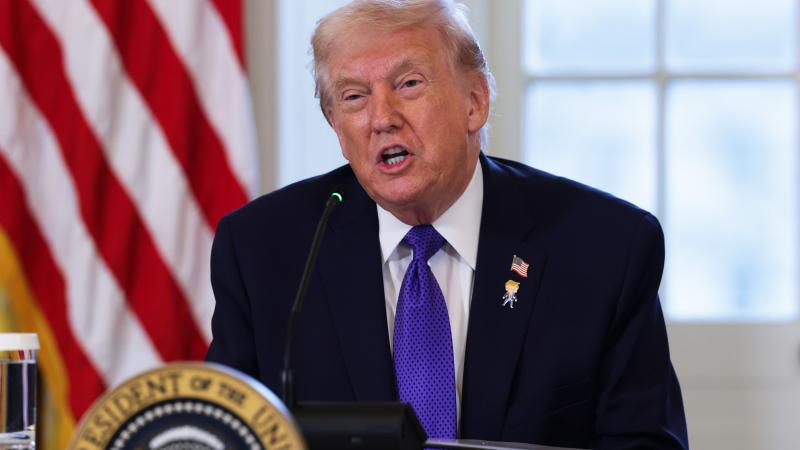Florida, Texas lead states' rights resistance against Big Tech and Big Government
With laws, lawsuits and orders, two southern red states challenge America's tilt leftward as D.C. Republicans struggle to find their footing.
From open borders and COVID-19 to critical race theory and censorship, Florida and Texas have formed a vanguard against the leftward tilting of America by the Biden administration, the Democratic Congress and Big Tech.
Gov. Ron DeSantis of Florida and Gov. Greg Abbott and Attorney General Ken Paxton of Texas have created a model for other GOP executives to use the states' rights enshrined in the Constitution's 10th Amendment to confront creeping government and monopolization, rallying conservatives who at times are frustrated that Republicans in Washington have failed to muster much resistance.
They've already rolled up a few wins, and unmistakably caught the attention of the Biden Justice Department, which on Friday sued Abbott for issuing an executive order prohibiting the transportation of illegal migrants through his state if they may be infected with COVID-19.
Texas seemed to relish a fresh chance to contest DOJ in federal court — where it has won other recent victories — and open another legal front for states' rights.
"I will always fight to protect the individual rights of Texans to decide what is best for themselves and their families," Paxton tweeted shortly after DOJ announced its action. "I will continue to oppose the Biden Admin as Democrats demonstrate their willingness to sacrifice freedom for government control."
Led by DeSantis, Florida has picked several of its own battles with Big Government and Big Tech.
When Democrats and their teachers' union allies began pushing earlier this year a school curriculum known as critical race theory — which espouses America is inherently racist — DeSantis mustered an executive order from his Education Department banning indoctrination in such ideologies.
"Florida's education system exists to create opportunity for our children," he noted in explaining his action. "Critical Race Theory teaches kids to hate our country and to hate each other. It is state-sanctioned racism and has no place in Florida schools."
Likewise, after a rash of conservative voices were censored from YouTube, Twitter and Facebook, DeSantis worked with the Florida Legislature to enact a law banning censorship based on political ideology.
Former President Donald Trump, who is banned on some of those platforms, immediately sued them under the state law as a Florida resident, and Twitter countersued the state to challenge the law, initiating a long legal process that will determine whether states can govern in the censorship debate.
DeSantis said the law was particularly important for Florida, where many exiles fled to from communist and socialist oppression.
"Many in our state have experienced censorship and other tyrannical behavior firsthand in Cuba and Venezuela," he noted."If Big Tech censors enforce rules inconsistently, to discriminate in favor of the dominant Silicon Valley ideology, they will now be held accountable."
Texas and Florida have also combined forces on occasion.
When the Biden administration eased border restrictions and created a wave of hundreds of thousands of illegal immigrants, Abbott summoned law enforcement and National Guard from around the country to help guard the border and protect local ranchers and residents overrun by the crush of illegal migrants.
DeSantis was one of the first to send reinforcements from his state law enforcement agencies.
"We are witnessing a catastrophe at the southern border under the Biden Administration," the Florida governor declared. "In recent months, we have seen people from the terrorist watch list, known sex offenders and a flood of fentanyl cross over the border. This is a national security crisis, and we must get it under control."
The aggressive, unbowed counteroffensive by Florida and Texas comes as many consveratives remain frustrated that Washington Republicans have not been able to muster an adequate resistance to Biden and the Democrats.
Fox News host Tucker Carlson recently addressed the issue in his monologue, shining a spotlight on a grievance often kept behind closed doors.
"For quite some time now we've wondered what's going on with congressional Republicans," Carlson lamented. "There are a lot of nice people in the Republican Party, but the point of a political party is not to be nice, it is to represent the interests of its voters. That's the only reason political parties exist. There is no other reason to have them except to represent their voters."
House Republican Leader Kevin McCarthy casts aside such concerns, saying his team is focused on winning back the House in 2022 to provide a true roadblock to the liberal agenda, and he likes the prospects.
"Majorities are not given, they're earned," McCarthy recently told Just the News. "But I believe in a 10. We're going to do it.”
With that election still 17 months away, the Texas-Florida nexus has prompted a series of legal battles that constitutional experts believe could be historic.
Harvard law professor emeritus Alan Dershowitz, for instance, says the Florida/Trump lawsuits against the social giants will be the most important free speech case of the 21st century so far and it is likely to end at the U.S. Supreme Court.
"The current situation is absolutely intolerable," Dershowitz told NewsMax. "You have these giant media tell us what we can see and what we can hear and being exempted by congressional legislation. And then we have them claiming their rights under the First Amendment because they are a private company."
















